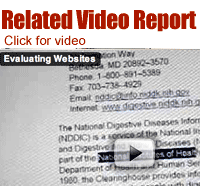
Common Core State Standard
SL.CCS.1/2/3/4 Grades 6-12: An essay of a current news event is provided for discussion to encourage participation, but also inspire the use of evidence to support logical claims using the main ideas of the article. Students must analyze background information provided about a current event within the news, draw out the main ideas and key details, and review different opinions on the issue. Then, students should present their own claims using facts and analysis for support. FOR THE WEEK OF AUG. 02, 2010 What online 'facts' can you trust? Don't let Google be your guide to credibilityWhile journalists use the Internet for background and fact checks, they mainly get information directly from primary sources rather than second-hand research. Show a primary source in an article.
Would you cite a news article in a term paper or other research report? List factors that make daily papers a trusted information source.
Find an example of content that presents viewpoints and opinion, not "straight news." Either can be used in school projects, if labeled properly.
Here's a good thing about the Internet that also can be a bad thing: Online information makes research for school easy . . . and risky. (By the way, that's called a paradox -- a statement that seems to contradicts itself. It's pronounced pa-RAH-docks.) Two new campus studies cite the hazards of web research for homework, business use, medical tips or other purposes. The takeaway: Check carefully to assure sources are credible and reliable. Although a prominent spot in search engine results doesn't automatically signal believability, Northwestern University researchers found that a majority of college freshmen click on the first search result no matter where it's from. More than 25 of the 102 students surveyed said they always choose the top result. "In some cases, the respondent regarded the search engine as the relevant entity for which to evaluate trustworthiness, rather than the website that contained the information," says the Illinois university's study, published in the International Journal of Communication.
In a University of Southern California study issued two weeks ago, large percentages of Internet users say they distrust online information. Sixty-one percent believe half or less of online information is reliable -- the lowest level since the Digital Future Project began nine years ago at the Annenberg School for Communication and Journalism at the Los Angeles university. Fourteen percent of respondents say only a small portion or none of the information online is reliable -- a percentage that has grown for the past three years.
Front Page Talking Points is written by
Felix Grabowski and Alan Stamm for NIEonline.com, Copyright 2026
Front Page Talking Points Archive►Reporters' arrest in Minneapolis church protest raises press freedom issue ►NASA prepares for return to the moon, starting with an orbital mission by four astronauts ►Minneapolis roundups and woman's death intensify debate over immigration agents' tactics ►Australia is a test case for social media age limits, with 16 as a minimum for accounts there now ►U.S. actions at sea against suspected drug smugglers raise military law issues ►Say goodbye to new pennies, a coin that outlived its purpose after 232 years ►Show of force: U.S. naval and air buildup near Venezuela signals possible military action |

